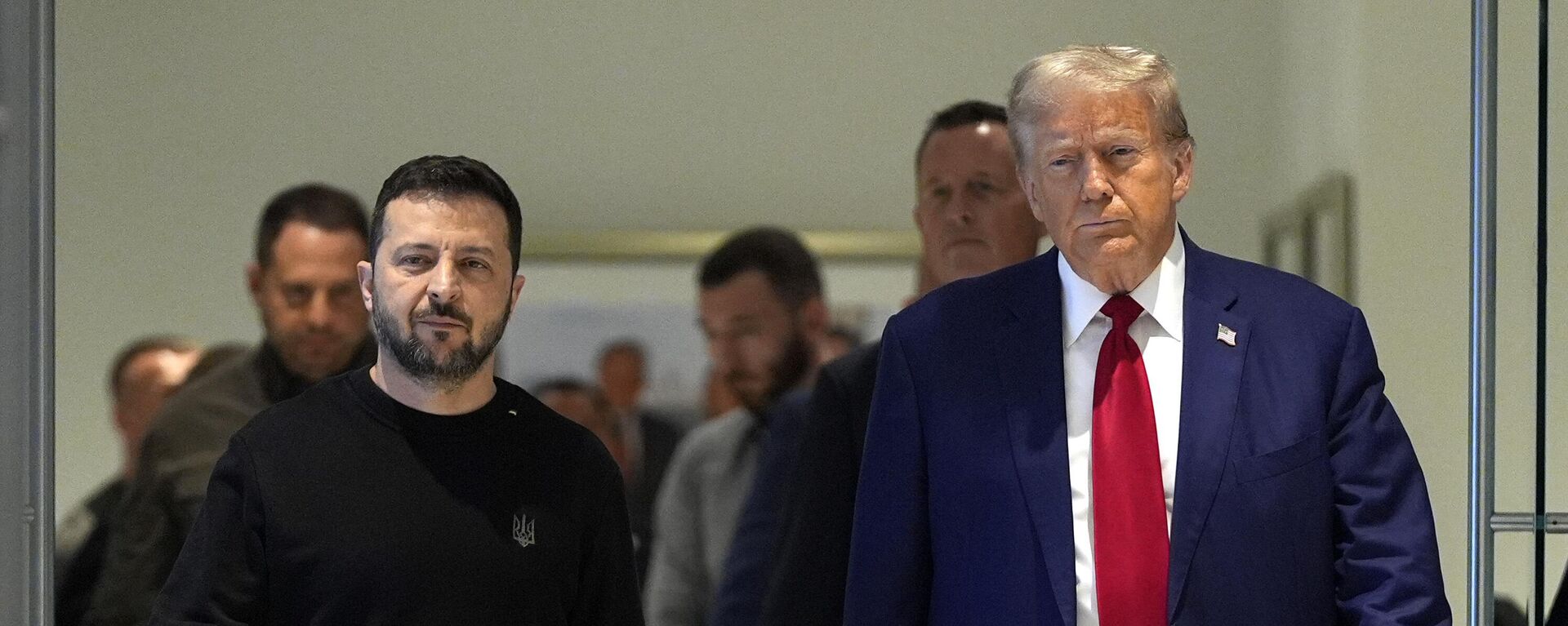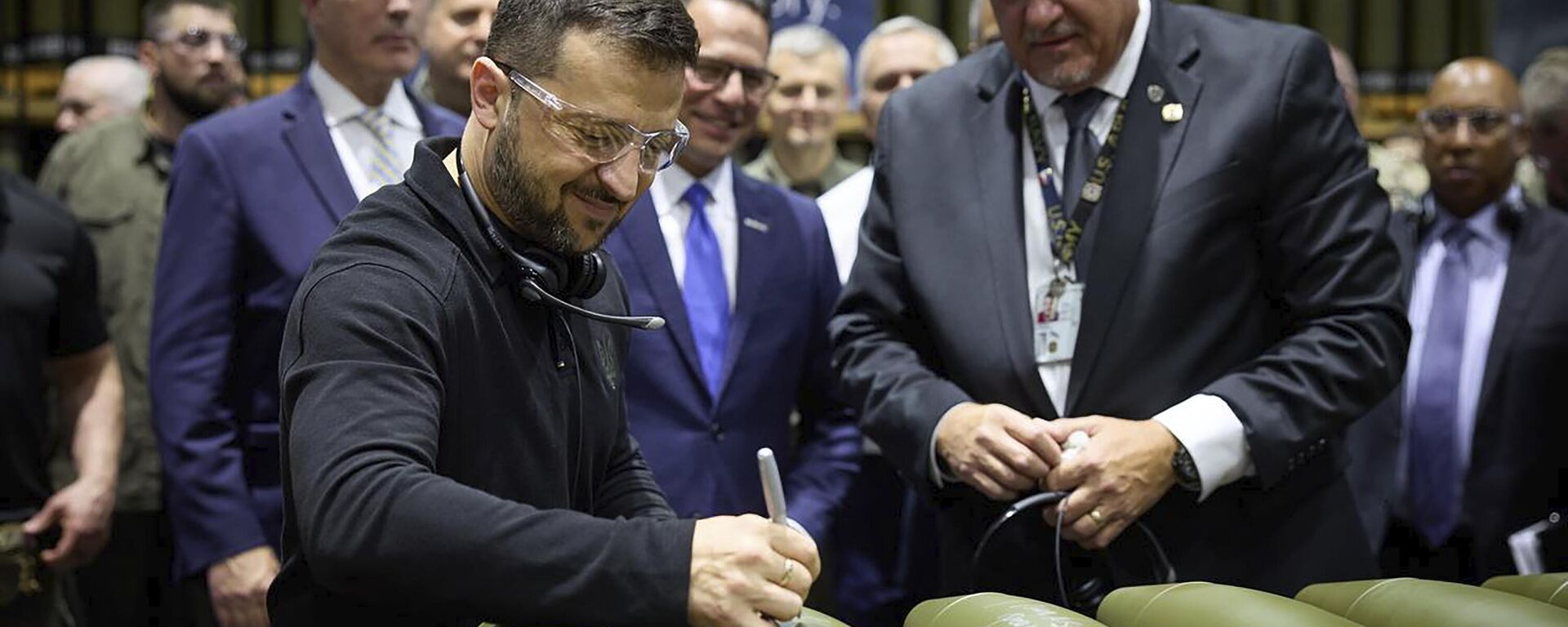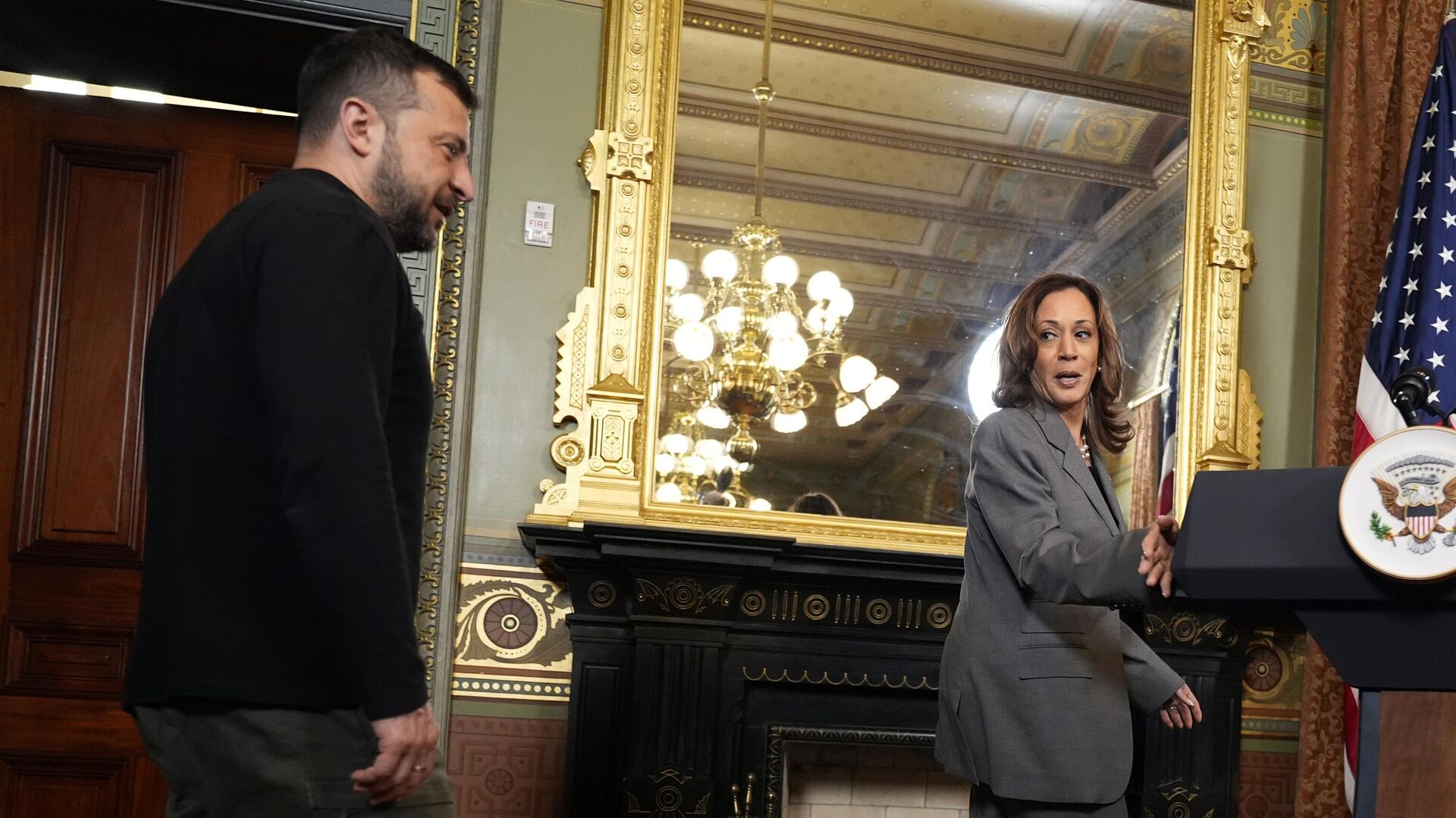https://sputnikglobe.com/20240928/zelenskys-pie-in-the-sky-hopes-for-long-range-missiles-slow-walked-by-washington---ex-dod-analyst-1120335054.html
Zelensky’s ‘Pie in the Sky’ Hopes for Long-Range Missiles Slow-Walked by Washington - Ex-DoD Analyst
Zelensky’s ‘Pie in the Sky’ Hopes for Long-Range Missiles Slow-Walked by Washington - Ex-DoD Analyst
Sputnik International
Volodymyr Zelensky left Washington on Thursday without approval to launch long-range strikes at targets deep inside Russia using NATO missiles, prompting media to suggest his "star power" has "faded" as Americans grow increasingly tired of or indifferent toward the conflict. A former DoD insider explains tells Sputnik what's really going on.
2024-09-28T17:38+0000
2024-09-28T17:38+0000
2024-09-28T17:38+0000
analysis
volodymyr zelensky
us
donald trump
michael maloof
ukraine
russia
nato
washington
us department of defense (dod)
https://cdn1.img.sputnikglobe.com/img/07e8/09/1c/1120334645_0:0:3068:1725_1920x0_80_0_0_34f3a6c1400f2a016a80d1125a1a18db.jpg
Ukraine's self-proclaimed president made last-ditch pre-election appeals to President Biden, Vice President Harris and lawmakers on Capitol Hill during his trip to Washington this week to sell his so-called "victory plan" - aimed at forcing Russia to sue for peace by greenlighting Ukraine's use of long-range NATO strike systems to attack Russia, and applying for membership in NATO "within months," rather than years.US and European legacy media proved surprisingly cool in their coverage of the visit by Zelensky, who until recently was treated with rock star status in Western capitals."Zelensky's Star Power Fades on Capitol Hill," the New York Times wrote of the trip, contrasting Zelensky's raucous reception in Washington two years ago to his "muted" visit this week, which saw just "a few dozen lawmakers huddl[ing] with him behind closed doors while the speaker of the House snubbed him.""Zelensky gives his 'victory plan' a hard sell in the US - did the pitch fall flat?" the BBC asked in its own post-trip analysis, pointing to the faux pas Zelensky made during the visit, from his attacks on possible future president Trump and his running mate in an interview with a liberal news magazine, to a trip to a Pennsylvania ammunition factory which Republicans decried as blatant election interference.President Biden sought to breath life into the visit by announcing $8 billion in additional military aid for Ukraine, including Joint Standoff Weapon glide bombs, drones, and Patriot air and missile defenses. But the main publicized goal of the trip: approval for strikes deep into Russia, was nowhere to be found in summaries of Zelensky's talks with US officials amid warnings from Moscow that such a step would put NATO and Russia in a state of war.Zelensky’s hosts “were polite and listened to him, but there’s too much at stake at this point,” Maloof suggested, stressing that granting Kiev's request would require direct US involvement in the conflict, something the DoD appears to be wary of providing.A big part of the problem for Zelensky is that the US is now so deep into the 2024 presidential campaign “that everybody is distracted by it,” according to Maloof, with the Biden-Harris White House likely seeking to avoid making “any decisions that will have long-term impact,” or prove unpopular among voters as support for additional Ukraine aid fades.Furthermore, a lot of the advice that Trump has been getting on Ukraine "comes primarily from neocons, and he’s seen what neocons have done in terms of getting the US into the very serious positions they’re into now, such as the overthrow of the legitimate government in 2014 in Ukraine. That’s all the work of these neocons,” Maloof said.Accordingly, no one, including Trump himself, "frankly knows" what “approach he would take” on Ukraine if he was elected, the observer said, warning that Russia might decide to continue the conflict indefinitely if pressed to make concessions it finds unacceptable.
https://sputnikglobe.com/20240927/trump-to-zelensky-ukraine-conflict-has-to-end-1120317608.html
https://sputnikglobe.com/20240927/ukraines-nato-sponsors-fear-theyll-run-out-of-money-to-continue-anti-russia-proxy-war-into-2025-1120319547.html
ukraine
russia
washington
Sputnik International
feedback@sputniknews.com
+74956456601
MIA „Rossiya Segodnya“
2024
News
en_EN
Sputnik International
feedback@sputniknews.com
+74956456601
MIA „Rossiya Segodnya“
Sputnik International
feedback@sputniknews.com
+74956456601
MIA „Rossiya Segodnya“
what did zelensky get in washington trip, was zelensky's washington trip a success, was zelensky's washington visit successful
what did zelensky get in washington trip, was zelensky's washington trip a success, was zelensky's washington visit successful
Zelensky’s ‘Pie in the Sky’ Hopes for Long-Range Missiles Slow-Walked by Washington - Ex-DoD Analyst
Volodymyr Zelensky left Washington on Thursday without approval to launch long-range strikes at targets deep inside Russia using NATO missiles, prompting observers to suggest his "star power" has faded as Americans grow increasingly tired of or indifferent toward the conflict. A former DoD insider explains told Sputnik what's really going on.
Ukraine's self-proclaimed president made last-ditch pre-election appeals to President Biden, Vice President Harris and lawmakers on Capitol Hill during his trip to Washington this week to sell his so-called "victory plan" - aimed at forcing Russia to sue for peace by greenlighting Ukraine's use of long-range NATO strike systems to attack Russia, and applying for membership in NATO "within months," rather than years.
US and European legacy media proved surprisingly cool in their coverage of the visit by Zelensky, who until recently was treated with rock star status in Western capitals.
"Zelensky's Star Power Fades on Capitol Hill," the New York Times
wrote of the trip, contrasting Zelensky's raucous reception in Washington two years ago to his "muted" visit this week, which saw just "a few dozen lawmakers huddl[ing] with him behind closed doors while the speaker of the House snubbed him."
"Zelensky gives his 'victory plan' a hard sell in the US - did the pitch fall flat?" the BBC
asked in its own post-trip analysis, pointing to the faux pas Zelensky made during the visit, from his attacks on possible future president Trump and his running mate in an interview with a liberal news magazine, to a trip to a Pennsylvania ammunition factory which Republicans
decried as blatant election interference.
President Biden sought to breath life into the visit by announcing
$8 billion in additional military aid for Ukraine, including Joint Standoff Weapon glide bombs, drones, and Patriot air and missile defenses. But the main publicized goal of the trip: approval for strikes deep into Russia, was nowhere to be found in summaries of Zelensky's talks with US officials
amid warnings from Moscow that such a step would put NATO and Russia in a state of war.
“I think Zelensky had a ‘pie in the sky’ goal of trying to get the US to give committed support, militarily, financially to get long-range missiles approved. I don’t think he fared very well,” ex-senior DoD security policy analyst Michael Maloof told Sputnik, commenting on the trip.
Zelensky’s hosts “were polite and listened to him, but there’s too much at stake at this point,” Maloof suggested, stressing that granting Kiev's request would require direct US involvement in the conflict, something the DoD appears to be wary of providing.
A big part of the problem for Zelensky is that the US is now so deep into the 2024 presidential campaign “that everybody is distracted by it,” according to Maloof, with the Biden-Harris White House likely seeking to avoid making “any decisions that will have long-term impact,” or prove unpopular among voters as support for additional Ukraine aid
fades.
“Clearly, Trump has an entirely different idea and approach than Harris and Biden have toward support for Ukraine. And I think that if he were to win, it would have a dramatic impact on…any future decision-making toward what arms Ukraine does have,” Maloof said. “Trump agreed to meet with [Zelensky], but he made it clear that he would be talking to President Putin. And he has a relationship there.”

27 September 2024, 15:14 GMT
On the other hand, a Trump-proposed peace plan remains murky, the ex-DoD insider stressed. “I think he’s not clear on what his goals are to achieve this peace that he keeps talking about. It’s not going to be solved ‘in 24 hours’. And it’s going to be much more complicated than he envisions at this point.”
Furthermore, a lot of the advice that Trump
has been getting on Ukraine "comes primarily from neocons, and he’s seen what neocons have done in terms of getting the US into the very serious positions they’re into now, such as the overthrow of the legitimate government in 2014 in Ukraine. That’s all the work of these neocons,” Maloof said.
Accordingly, no one, including Trump himself, "frankly knows" what “approach he would take” on Ukraine if he was elected, the observer said, warning that Russia might decide to continue the conflict indefinitely if pressed to make concessions it finds unacceptable.

27 September 2024, 17:18 GMT




